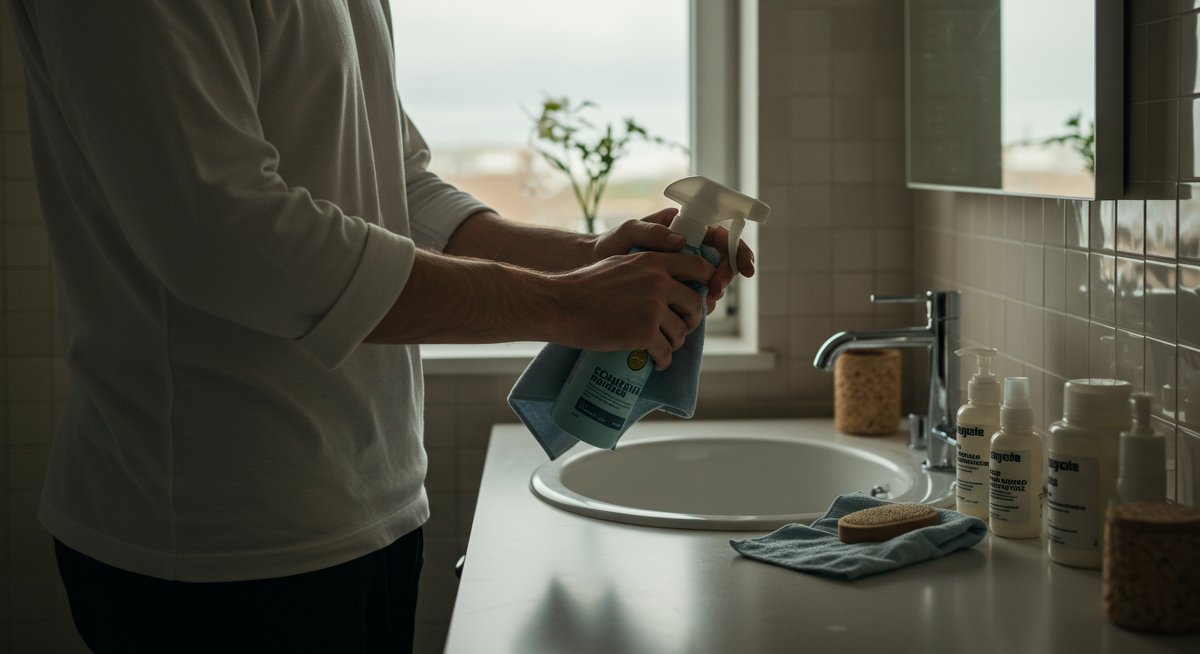For experienced vegans, the commitment to ethical living extends far beyond the plate. It's about making conscious choices in every facet of your life, including how you maintain your home. This guide is designed for those already familiar with the basics of veganism, offering an in-depth look at creating a truly cruelty-free and eco-friendly cleaning routine. We'll explore strategies, delve into specific product recommendations, and provide insights to help you optimise your cleaning practices for a healthier home and a lighter environmental footprint.

Deep dive into vegan home cleaning for experienced vegans
As a seasoned vegan, you understand the importance of scrutinising ingredients and certifications. But did you know that many seemingly innocuous cleaning products contain animal-derived ingredients or are tested on animals? Hidden offenders include stearic acid (often from animal fat), glycerin (can be animal-derived), and various animal-based enzymes. This section moves beyond basic swaps, focusing on how to identify and avoid these hidden ingredients and building a truly sustainable cleaning system.
Here's a breakdown of what we'll cover:
- Decoding Ingredient Labels: Learn how to decipher complex ingredient lists, identify animal-derived components, and understand the certifications that guarantee cruelty-free and vegan status.
- Creating a Zero-Waste Cleaning System: Explore practical strategies for minimising waste, from refilling containers to making your own cleaning solutions.
- Advanced DIY Cleaning Recipes: Discover more complex and effective homemade cleaning solutions using natural ingredients.
- Sustainable Sourcing and Packaging: Prioritise products from companies committed to ethical sourcing, sustainable packaging, and environmental responsibility.
Example 1: Decoding the Fine Print
Let's say you're considering a new all-purpose cleaner. The label lists "sodium stearate" as an ingredient. This is where your advanced vegan knowledge comes in. Sodium stearate is a salt of stearic acid, which can be derived from animal fats. To be certain, you'd need to contact the manufacturer directly or check their website to confirm the source. Experienced vegans know this level of detail is crucial.
Example 2: Building a Refillable System
Instead of buying new plastic bottles every time, consider a refillable system. Purchase concentrated cleaning solutions in bulk and refill your existing spray bottles. This reduces plastic waste and can save you money in the long run. Look for companies that offer concentrated formulas and refill options, such as Blueland or Grove Collaborative (check their website for refill programs).
Example 3: Going Beyond the Basics
Experienced vegans often explore more advanced DIY options. For example, you can create a powerful, all-purpose cleaner by combining white vinegar, castile soap, essential oils (for scent and antibacterial properties), and water. This allows you to control every ingredient and ensures a truly vegan and eco-friendly product. Remember to always test any new cleaning solution in an inconspicuous area first!
Common Mistakes:
- Assuming "natural" equals vegan: Many products touting "natural" ingredients still contain animal-derived components.
- Ignoring packaging: Even vegan products contribute to waste if they come in excessive packaging.
- Not researching companies: Relying solely on product labels without researching the manufacturer's ethical practices.
Expert Tip:
Create a spreadsheet or use a note-taking app to track your preferred cleaning products. Note their ingredients, certifications, and where you purchase them. This helps you stay organised and easily identify vegan-friendly options.
Advanced strategies and insights
This section delves into strategies for creating a truly sustainable cleaning routine. We’ll explore how to minimise waste, reduce your carbon footprint, and make informed choices that align with your values. It’s not just about what you clean with, but how you clean, too.
- Embracing Zero-Waste Principles: Implementing practices like refilling bottles, composting cleaning cloths, and using reusable tools.
- Reducing Your Carbon Footprint: Considering the environmental impact of cleaning product ingredients, manufacturing, and transportation.
- Supporting Ethical Brands: Prioritising companies with strong ethical and environmental commitments.
- DIY Mastery: Experimenting with advanced DIY recipes for cleaning solutions.
Example 1: Zero-Waste Dishwashing
Instead of using plastic dish soap bottles, try a solid dish soap bar and a wooden dish brush. When your soap bar runs out, you simply compost the used soap. For your brush, choose one with a replaceable head. This minimises plastic waste and reduces the need for single-use products.
Example 2: Minimising Your Carbon Footprint
Consider the environmental impact of your cleaning products. Look for products with low VOCs (Volatile Organic Compounds), which contribute to air pollution. Choose concentrated formulas to reduce the amount of packaging and transportation emissions. Seek out products that are made locally to minimise shipping distances.
Example 3: Supporting Ethical Brands
Research the companies behind the products you use. Do they have a strong commitment to environmental sustainability and ethical sourcing? Do they offer fair wages and working conditions? Brands like Dr. Bronner's and Method are known for their ethical practices and commitment to sustainability.
Common Pitfalls:
- Overuse of cleaning products: Using excessive amounts of product doesn't necessarily lead to better cleaning and can be wasteful.
- Ignoring the impact of water usage: Cleaning practices can impact water consumption, so be mindful of the amount of water you use.
- Lack of consistency: Sustainable cleaning requires a consistent effort to maintain the practices.
Expert Tip:
Create a cleaning schedule to make your routine more efficient. Dedicate certain days to specific tasks and incorporate deep cleaning activities. This will help you stay organised and prevent cleaning from becoming overwhelming.

Optimising your vegan home [cleaning supplies]
This section provides specific recommendations for vegan-friendly cleaning supplies, from basic essentials to advanced tools. We’ll cover the best products for each area of your home, along with tips for making the most of them. So, what cleaning supplies should you have on hand?
- All-Purpose Cleaners: Versatile cleaners suitable for multiple surfaces.
- Dish Soap: Effective and gentle dishwashing detergents.
- Laundry Detergent: Powerful and eco-friendly laundry solutions.
- Bathroom Cleaners: Products specifically designed for cleaning and disinfecting bathrooms.
- Specialty Cleaners: Products for specific tasks, such as oven cleaning or glass cleaning.
Example 1: All-Purpose Cleaner - The Versatile Workhorse
Look for an all-purpose cleaner that is plant-based, cruelty-free, and effective on various surfaces. Many brands offer concentrated formulas, which are better for the environment. Some examples include Better Life all-purpose cleaner or Puracy multi-surface cleaner.
Example 2: Dish Soap - Keeping Things Sparkling
Dish soap can be easily overlooked. Look for brands that are both vegan and effective at cutting grease. Look for options such as Mrs. Meyer's dish soap or Seventh Generation dish soap, both readily available and widely known for their plant-based formulations.
Example 3: Laundry Detergent - For Fresh and Clean Clothes
Laundry detergent is a crucial element, look for brands that offer options for different laundry needs, such as sensitive skin or stain removal. Check out brands like Grab Green or Molly's Suds for effective, eco-friendly, and vegan-friendly laundry solutions. These options often come in eco-friendly packaging, such as cardboard boxes or refillable containers.
Common Mistakes:
- Using too much product: Overuse can leave residue and isn't more effective.
- Not reading labels carefully: Always check the ingredients and certifications.
- Choosing products based solely on price: Consider the long-term cost and environmental impact.
Expert Tip:
When trying a new product, start with a small amount and test it in an inconspicuous area. This prevents potential damage and helps you determine the product's effectiveness.
Integrating advanced vegan practices
It’s time to explore integrating advanced vegan practices into your home cleaning routine. This means going beyond the basics and embracing a more holistic approach to sustainability. So, how can you elevate your efforts?
- DIY Cleaning Solutions: Creating your own cleaning products using natural ingredients.
- Eco-Friendly Cleaning Tools: Using reusable and sustainable cleaning tools.
- Reducing Plastic Waste: Minimising plastic packaging and opting for refillable options.
- Sustainable Sourcing: Choosing products from companies with strong ethical and environmental commitments.
Example 1: Homemade All-Purpose Cleaner
Create a simple all-purpose cleaner by mixing equal parts white vinegar and water in a spray bottle. Add a few drops of essential oil for fragrance and antibacterial properties (tea tree oil is a popular choice). This is an inexpensive and effective alternative to commercial cleaners.
Example 2: Eco-Friendly Cleaning Tools
Replace disposable paper towels with reusable cloths made from organic cotton or microfiber. Use wooden dish brushes and replace the heads as needed. Consider a bamboo or stainless-steel cleaning caddy to store your supplies.
Example 3: Reducing Plastic Waste
Purchase cleaning products in bulk and refill your existing spray bottles. Look for products that come in concentrated formulas, which reduces the amount of packaging. Consider using a solid dish soap bar instead of liquid dish soap.
Common Pitfalls:
- Not storing DIY cleaners properly: Always label your DIY cleaners and store them out of reach of children and pets.
- Using essential oils without caution: Some essential oils can be harmful to pets. Always research the safety of essential oils before using them.
- Giving up too soon: Transitioning to a new cleaning routine takes time and effort. Be patient and persistent.
Expert Tip:
Make your own cleaning tablets. Combine baking soda, citric acid, essential oils, and water in a mold. Let them dry, and use them in your toilet bowl or other cleaning needs. This is another way to reduce plastic waste.
Scaling your impact: Beyond personal choices
Experienced vegans understand that individual actions, while impactful, are just the beginning. How can you extend your commitment to influence others and create lasting change? That’s what we’re getting to next.
- Sharing Your Knowledge: Educating friends, family, and colleagues about vegan home cleaning.
- Supporting Vegan Businesses: Purchasing products from companies committed to ethical and sustainable practices.
- Advocating for Change: Contacting manufacturers and retailers to request vegan and eco-friendly products.
- Participating in Community Initiatives: Joining local clean-up efforts and promoting sustainable practices.
Example 1: Sharing Your Knowledge
Host a workshop or presentation on vegan home cleaning. Share your knowledge and experience with friends, family, and community members. Provide them with resources and information on how to get started.
Example 2: Supporting Vegan Businesses
Make a conscious effort to purchase products from vegan-friendly businesses. This includes cleaning product manufacturers, eco-friendly retailers, and companies committed to ethical and sustainable practices. Check out brands like Blueland or Grove Collaborative for cleaning and household needs.
Example 3: Advocating for Change
Contact your favorite cleaning product manufacturers and retailers. Request that they offer vegan and eco-friendly options. Express your interest and demand for sustainable products. This can influence their decision-making and encourage them to make positive changes.
Common Mistakes:
- Assuming others won't be interested: Don't be afraid to share your passion with others.
- Not being persistent: Advocate for change continuously, even if you don't see immediate results.
- Focusing solely on individual actions: Combine personal choices with efforts to influence others.
Expert Tip:
Connect with like-minded individuals. Join online communities or local groups focused on veganism and sustainable living. Share your experiences, ask questions, and learn from others.
Expert-level vegan living insights
As an experienced vegan, you’re already on the right track. Your insights are invaluable. I hope this guide has provided you with new ideas and motivation. Keep learning, keep experimenting, and keep making a positive impact on the world. Your dedication to ethical and sustainable living is an inspiration.
In the end, vegan home cleaning is not just about cleanliness; it’s about living a life that aligns with your values. By embracing these practices, you can create a home that is both sparkling clean and kind to the planet. If you're on this journey too, I'd love to hear how it goes for you. What are your favorite vegan cleaning products? What tips do you have for others? Share your thoughts and experiences in the comments below!